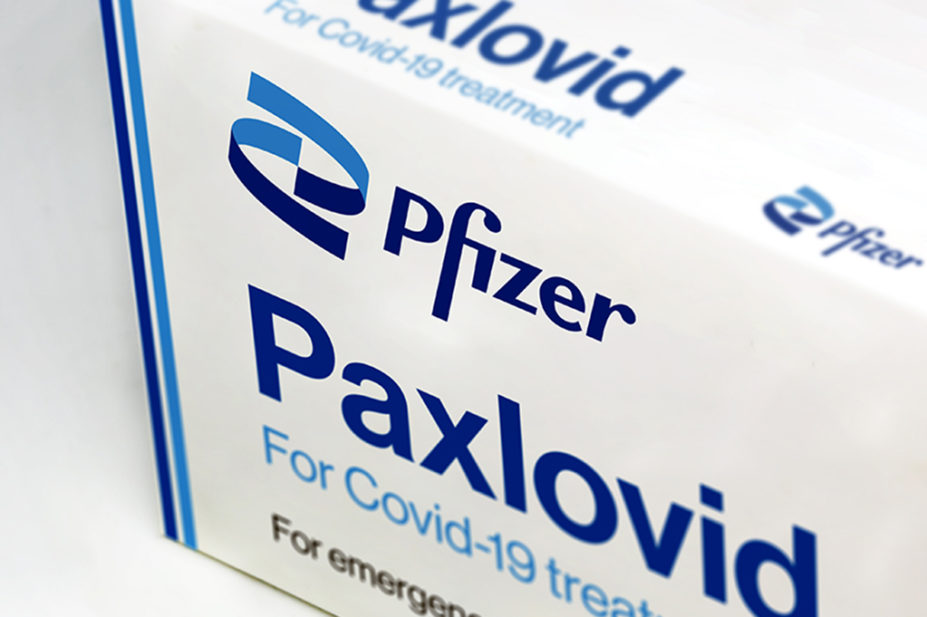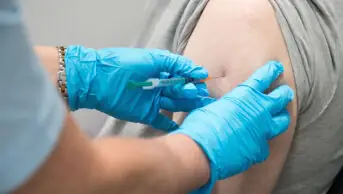
Shutterstock.com
The oral antiviral Paxlovid (nirmatrelvir + ritonavir; Pfizer) should be offered as a first-line treatment to patients with hospital-onset COVID-19, as well as to eligible COVID-19 patients in the community, updated UK guidance has said.
The UK-wide clinical commissioning policy for hospitalised patients was published on 27 January 2022 and says that patients who test positive for COVID-19 following their admission to hospital should be offered Paxlovid first, before being offered the intravenous antiviral remdesivir (Veklury; Gilead), which is now a licensed second-line treatment option, if paxlovid is not a suitable option.
Sotrovimab (Xevudy; GSK and Vir Biotechnology), a monoclonal antibody treatment, is also available for this patient cohort as a third-line treatment option, if required.
Paxlovid, which was first approved for use in the UK at the end of December 2021, works by inhibiting a protease required for viral replication and is supplied as a pack providing a five-day treatment course.
The UK government also updated advice for the treatment of non-hospitalised COVID-19 patients to advise clinicians that, from 10 February 2022, eligible patients who are symptomatic and showing no evidence of clinical recovery should be offered either Paxlovid or sotrovimab as a first-line treatment, with remdesivir as a second-line option (see Box).
The oral antiviral molnupiravir (Lagevrio; MSD) will only be considered as a third-line option from 10 February 2022.
Previously, clinicians were advised to provide eligible patients with sotrovimab unless it was contraindicated, in which case they could be offered a five-day course of molnupiravir.
Final trial results, published by Pfizer in December 2021, suggested Paxlovid reduced the relative risk of COVID-19-associated hospitalisation or death by 88% in those who received treatment within five days of symptoms appearing.
Fiona Marra, a consultant-accredited infectious disease pharmacist, based in Glasgow, who is involved in the deployment of antivirals, said that the data for Paxlovid looked “very promising” and that ritonavir — although complicated with regards to drug interactions — was one that prescribers have “decades of experience” managing.
“A five-day course means it has many more options to use than in HIV, such as stopping and restarting medications like statins,” she said.
“The individual patient management of this drug interaction is an area that should entirely be led by pharmacists and is absolutely within our skill set to do so.
“A safe and pragmatic drug interaction review of Paxlovid by a pharmacist, using the Liverpool drug interaction tool, will optimise the most amount of patients getting access to this first-line drug.”
In a press release published by the Department of Health and Social Care (DHSC) on 28 January 2022, health secretary Sajid Javid described the updated guidance as “an important milestone” that could lead to “potentially thousands of lives” being saved.
“We will set out further details on access to the new antiviral soon — until then, anyone who is eligible who tests positive for COVID-19 and has symptoms should sign up to the PANORAMIC trial for the chance to receive our other antiviral, molnupiravir,” he added.
The PANORAMIC study, which as of 28 January 2022 had 5,709 participants across 38 sites, is deploying the antiviral molnupiravir to patients. Anyone aged over 50 years or between 18 to 49 years with certain underlying health conditions can sign up to the study as soon as they receive a positive PCR or lateral flow test result. They need to be experiencing COVID-19 symptoms that began in the past five days to be eligible to enrol.
According to the DHSC press release, further details on wider deployment of Paxlovid — potentially through the PANORAMIC study — will be set out “in due course”.
Through the Antivirals Taskforce, the UK government has procured 4.98 million courses of antivirals — 2.75 million courses of Paxlovid and 2.23 million courses of molnupiravir, the press release said.
Read more: Antivirals for COVID-19 — five questions that must be answered
Box: Patient cohorts to be prioritised for treatment with neutralising monoclonal antibodies and oral antivirals
- All patients with Down’s syndrome;
- Some patients with a solid cancer, such as active metastatic cancer, or active solid cancers at any stage;
- Some patients with a haematological disease and stem cell transplant recipients (e.g. all patients with sickle cell disease);
- Some patients with renal disease (e.g. renal transplant recipients);
- Some patients with liver disease (e.g. those on immune suppressive therapy);
- Some patients with immune-mediated inflammatory disorders (those who have received treatment with rituximab or another B cell depleting therapy in the past 12 months);
- Some patients with primary immune deficiencies (e.g. severe combined immunodeficiency);
- Some patients with HIV/AIDS (e.g. those with high levels of immune suppression);
- All solid organ transplant recipients;
- Some patients with rare neurological conditions, such as multiple sclerosis.


